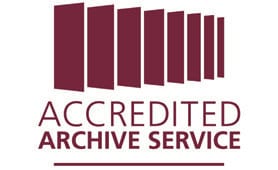Hot off the University of Lincoln’s Press Office, from Elizabeth Mitchell:
 Staff and student researchers from the University of Lincoln now benefit from access to the UK’s first accredited film archive, after the Media Archive for Central England (MACE) was recognised for its outstanding service. The Archive Service Accreditation is the new quality standard created to celebrate good performance in service and delivery, and MACE has been named among the first six organisations in the country to receive the quality mark. The screen archive for the East and West Midlands is housed in the University of Lincoln’s School of Media, and it is the only resource of its kind to receive the award from the UK Archive Service Accreditation Committee, which represents the archives sector nationally.
Staff and student researchers from the University of Lincoln now benefit from access to the UK’s first accredited film archive, after the Media Archive for Central England (MACE) was recognised for its outstanding service. The Archive Service Accreditation is the new quality standard created to celebrate good performance in service and delivery, and MACE has been named among the first six organisations in the country to receive the quality mark. The screen archive for the East and West Midlands is housed in the University of Lincoln’s School of Media, and it is the only resource of its kind to receive the award from the UK Archive Service Accreditation Committee, which represents the archives sector nationally.
 Earlier this year, MACE collaborated with experts from Lincoln School of Media to create a unique series of documentaries, entitled ‘Midlands on Film’. The DVDs celebrated the on-screen heritage of the region. Sarah Barrow, Head of the Lincoln School of Media, said: “We are so pleased to have MACE on our doorstep – the archive offers high quality tangible opportunities to our students, graduates and staff as a base for research and employment. We really look forward to developing that connection at such an exciting time and congratulate the team for achieving this well-deserved recognition of their work.”
Earlier this year, MACE collaborated with experts from Lincoln School of Media to create a unique series of documentaries, entitled ‘Midlands on Film’. The DVDs celebrated the on-screen heritage of the region. Sarah Barrow, Head of the Lincoln School of Media, said: “We are so pleased to have MACE on our doorstep – the archive offers high quality tangible opportunities to our students, graduates and staff as a base for research and employment. We really look forward to developing that connection at such an exciting time and congratulate the team for achieving this well-deserved recognition of their work.”
 MACE was assessed by an expert team from the committee, which stated: “This was a very strong application and noted the excellence of the documentation provided… MACE offers excellent online access and the sheer range of opportunities to access the archive collections impressed the panel.”
MACE was assessed by an expert team from the committee, which stated: “This was a very strong application and noted the excellence of the documentation provided… MACE offers excellent online access and the sheer range of opportunities to access the archive collections impressed the panel.”
Director of MACE, James Patterson, said: “We are delighted to be among the first archives to achieve accreditation under this new scheme. The Archive Service Accreditation standard reflects the progress that MACE has made in developing a fully rounded and professional service for the regions we represent.”
The registered charity selects and preserves documents and provides public access to film, video and digital moving images which document the culture and history of the region’s twelve counties. Its online catalogue of 50,000 titles, which includes over 4,000 video clips, is a resource used extensively by academic researchers, filmmakers and media enthusiasts.
